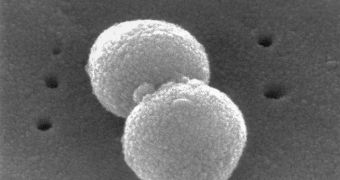The results of a new genetic investigation have revealed that one of the most dangerous strains of pneumonia-causing bacteria has had its evolutionary patterns influenced by human-produced factors, such as for example the antibiotics and vaccines it was subjected to over the years.
Scientists arrived at these conclusions after they looked at the genetic history of the bacterial strain. They conclude that natural selection can often be influenced by humans and their actions, even if they are taken unknowingly.
The strain of Streptococcus pneumoniae that was analyzed in this study were collected from patients in 22 countries. More than 240 samples were harvested overall, and the international team of researchers that conducted the work managed to decipher the complete genetic blueprints of the strain.
In order to understand how the microorganism changed over a longer period of time, the group collected all the samples between 1984 and 2008. This gave the bacteria ample time to adapt itself to the antibiotics and vaccines that were used to destroy them throughout these years.
The strain of pneumonia that was of particular interest to researchers is called Pneumococcal Molecular Epidemiology Network clone 1 (PMEN1), and it was first isolated in Barcelona, Spain, in 1984.
According to the new study that the international group published in the January 28 issue of the top journal Science, it would appear the PMEN1 in fact appeared around 1970. This proved it took experts about one and a half decades to detect it.
“When this clone emerged, it emerged into a world in which penicillin was frequently used,” explains Wellcome Trust Sanger Institute molecular microbiologist Stephen Bentley, who is based in Hinxton, England. He is also the coauthor of the new research paper.
The reason why this bacterial strain spread so quickly is because it had to compete against variants of itself that were susceptible to the effects of penicillin. As the other organisms were killed off, it managed to thrive due to its resilience to the widely-used chemical.
“Although it’s already got a winning formula for spreading around the globe, it’s constantly rearranging its DNA,” Bentley says of PMEN1. This makes it very difficult to fight against it, Science News reports.
However, thanks to the new study, it may soon become possible to develop new methods of fighting this resilient strain of pneumonia, geneticists say.

 14 DAY TRIAL //
14 DAY TRIAL //